#Mehmed: Sultan of Conquests
Explore tagged Tumblr posts
Text
This crown with pearls and red stone with form as cross in front is worn on Toprak Sergen as Kekavmenos in Alparslan: The Great Seljuk Urdu (Alparslan: Büyük Selçuklu) in Season 1 Episode 22 (2022) and its worn later on Ghassan Massoud as Eyüp El Ensari in Mehmed: Sultan of Conquests (Mehmed: Fetihler Sultani) in Season 1 Episode 2 (2024)


#recycled accessories#Alparslan: Büyük Selçuklu#Alparslan The Great Seljuk Urdu#Mehmed: Fetihler Sultani#Mehmed: Sultan of Conquests#historical drama#costume drama#period drama#reused costumes#reused jewellery
2 notes
·
View notes
Text


This golden piece of jewellery with clear stones was first worn by Anastasia Hatun (later Kösem Sultan) in the fifth episode of the first season of Magnificent Century: Kösem.
Nine years later, the piece appeared again. This time it was worn upside down and attached to a hat. It can be seen on Hüma Hatun in the second episode of the first season of Fatih: Sultan of Conquest.
#Muhteşem Yüzyıl: Kösem#Magnificent Century Kösem#Magnificent Century Kosem#Mehmed Fetihler Sultani#Fatih#Fatih (2024)#Fatih Sultan of Conquest#period drama#costume drama#historical drama#Kösem Sultan#Kosem Sultan#Hüma Hatun#Huma Hatun#reused jewellery#recycled jewellery
13 notes
·
View notes
Text

Sultan Mehmed II (1432-1481), also known as "Al-Fatih" which means "the Conqueror", ruled the Ottoman Empire and is famed for conquering "the unconquerable", Constantinople. He is regarded highly for his brilliance and he's also famously known for fulfilling both Islamic and Christian prophecies with his conquest. His strategic use of massive cannons and elite soldiers including the Janissaries has enabled this significant seige at the age of 21.
Following the conquest, he transformed Constantinople into Istanbul, emphasizing religious tolerance by allowing various faiths to coexist in peace which was unlike what the crusaders did. He is an advocate to the prophecy of Prophet Muhammad (peace be upon him), where a certain pious ruler among the believers was prophecised to conquer Constantinople in the future. His administration was marked by legal reforms, blending Islamic law with civil governance which laid the groundwork for a centralized state.
Mehmed II also promoted cultural growth by inviting scholars and artists to his court, sparking an era of learning and creativity within the empire, often referred to as the "Ottoman Classical Age". His legacy is a testament to his dual role as a military leader and a patron of culture.
His conquest of Constantinople is considered a turning point in world history, leading to the end of the medieval period and the beginning of the Renaissance in Europe

0 notes
Text

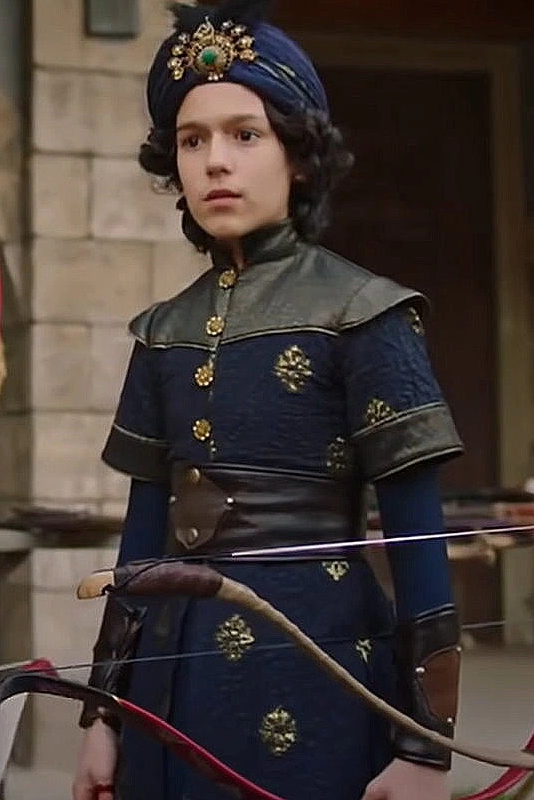
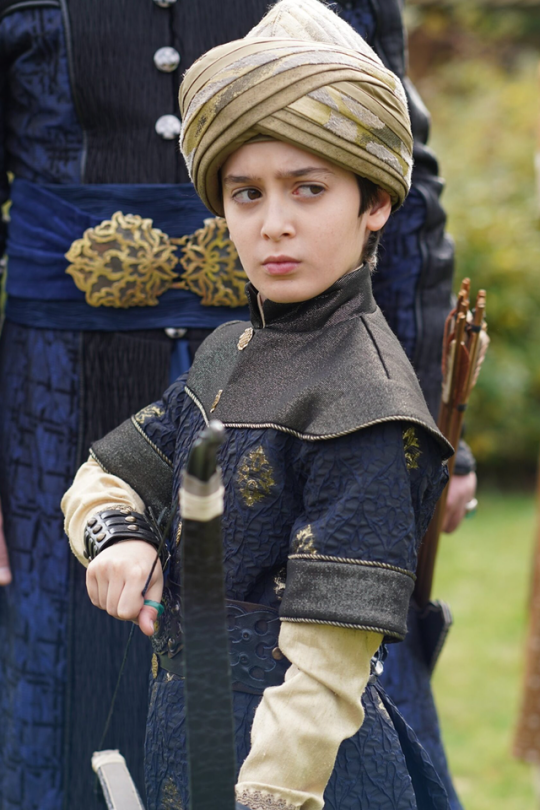
This blue and gray kaftan with gold embellishments was first worn by Umut Nalbantoğlu as Sultan Mehmed IV in the final episode of Muhteşem Yüzyıl: Kösem (Magnificent Century: Kösem) in 2017.
The kaftan appeared again in the twenty-sixth episode of the first season of Tozkoparan İskender on Yağız Kılınç as Sinan Karayaman in 2021.
It was also worn by Miraç Sözer as Şehzade Mehmed (later Sultan Mehmed II) in the second episode of the 2023 first season of Kızılelma: Bir Fetih Öyküsü (Golden Apple: The Grand Conquest).
Costume Credit: Anne81, Wardrobeoftime
Follow: Website | Twitter | Facebook | Pinterest | Instagram
#magnificent century: kosem#tozkoparan iskender#golden apple: the grand conquest#Kızılelma: Bir Fetih Öyküsü#Muhteşem Yüzyıl: Kösem#Umut Nalbantoğlu#Yağız Kılınç#Miraç Sözer
248 notes
·
View notes
Text
Dracula a Love Story characters and their historical counterparts
Vlad - Vlad III, also known as Vlad the Impaler and Vlad Dracula (Vlad Țepeș), was a 15th-century ruler of Wallachia, notorious for his brutal punishment methods, particularly impaling his enemies. He defended his realm from the Ottoman Empire and became a national hero in Romania.


Mehmed - Mehmed II, also known as Mehmed the Conqueror (Mehmed bin Murad), was the Ottoman Sultan who famously captured Constantinople in 1453. Historically, Mehmed II clashed with Vlad Dracula during campaigns in Wallachia, adding political depth to their enmity.


Radu - Radu III, also known as Radu the Handsome, was the younger brother of Vlad the Impaler and historically served as a ruler of Wallachia under Ottoman control. His rivalry with Vlad is well-documented, as Radu supported the Ottomans while Vlad opposed them.


Sultan Murad - Murad II was a formidable ruler who expanded Ottoman control in the Balkans and fought against various European coalitions. His campaigns laid the groundwork for the later conquests of his son, Mehmed II.


Gjerg Skanderberg - Gjergj (Gjergj Kastrioti), commonly known as Skanderbeg, was an Albanian feudal lord and military commander who led a rebellion against the Ottoman Empire. Skanderbeg's legacy as a defender of Christian Europe against the Ottomans is similar to how Vlad Dracula is viewed by some in Romania. Both are celebrated as national heroes who fought for independence and freedom in their respective lands.


Erzsebet (Erzsi) - Erzsébet Báthory (Countess Elizabeth Báthory de Ecsed), also known as The Blood Countess or Countess Dracula, was a Hungarian noblewoman from the late 16th and early 17th centuries, infamous for allegedly torturing and killing young girls. She is considered one of the most prolific female serial killers in history.


#romance club#rc dracula a love story#rc vlad#rc mehmed#rc radu#rc murad#rc gjerg#rc erzsi#Just a little history lesson
50 notes
·
View notes
Text
Tongues of Conquest



Pairing: Mehmed ii x servant!tutor!reader Synopsis: When the Sultan of the Ottoman Empire seeks mastery of the Italian tongue, he enlists an unlikely tutor—a young servant fluent in ten languages. Their lessons begin as mere diplomacy, but amidst the exchange of words, unspoken feelings surface. In a world where loyalty and ambition intertwine, will language become a bridge between hearts or a barrier to truth? Tags: Slow Burn, Forbidden Romance, Jealousy, Historical Fiction, Tutor/Student? Dynamics, Mutual Pining, Ottoman Empire
The conquest of Constantinople had marked the dawn of a new empire. Sultan Mehmed II, now the conqueror of two worlds, found himself in need of a new skill—mastery of the Italian tongue. His ambitions stretched far beyond the Bosporus, and to communicate with the Italian envoys, traders, and rulers of Rome, he required someone both capable and discreet.
That someone, improbably, was you.
Your origins were humble, a servant captured during the siege of the city. But your gift for languages had not gone unnoticed. Within weeks, whispers of the girl who spoke in ten tongues reached the Sultan’s court, and soon after, you were brought to him.
---
The first time you saw Mehmed, he stood with the weight of an empire on his shoulders. His presence was magnetic, his dark eyes sharp with intelligence and scrutiny.
"You are the one they speak of," he said, his voice smooth but commanding.
You bowed low, keeping your eyes on the marble floor. “Yes, my Sultan.”
He studied you, a flicker of curiosity crossing his face. “Italian is what I require. I trust you can teach me?”
“Yes, my Sultan.”
"Good," he said simply, dismissing the room with a wave of his hand. "We begin tomorrow."
---
The lessons began in a grand library adorned with ornate carvings and shelves stacked with books in languages you could only dream of reading. Mehmed sat opposite you, his posture rigid, his gaze focused.
Your relationship was formal. He was your Sultan, and you were his servant. You corrected his pronunciation, guided him through verb conjugations, and drilled him on vocabulary. He was a quick learner, his mind as sharp as his sword.
“You speak Italian like a Roman,” he remarked one day, his tone almost playful.
You smiled faintly, uncertain of how to respond. “I’ve studied it for many years.”
“And yet you ended up here,” he said, his voice soft but probing.
You hesitated. “Fate has curious designs, my Sultan.”
His eyes lingered on you for a moment longer than necessary before he nodded, the conversation ending as abruptly as it began.
---
It was during one of these lessons that the first spark ignited. Mehmed stumbled over a particularly complex sentence, and you couldn’t suppress a quiet laugh.
His brow arched. “You find this amusing?”
“My Sultan, even you cannot conquer grammar as swiftly as you conquered Constantinople.”
For a moment, there was silence, and then a soft chuckle escaped him. It was the first time you’d heard him laugh, and the sound warmed something deep within you.
“I suppose even I must have my limits,” he said, his voice lighter than usual.
From that day, a subtle shift occurred. He began to ask you questions—not about Italian, but about yourself. Where had you learned so many languages? Did you miss your homeland?
You answered carefully, always aware of the line between servant and sovereign. But with each conversation, the line seemed to blur.
---
It was a quiet afternoon in the grand library. The sunlight filtered through the tall windows, illuminating the dust motes that danced in the air. You sat across from Mehmed, a thick tome of Italian grammar open between you. He was focused on his writing, his brows furrowed as he attempted to conjugate verbs in a letter he was drafting.
Out of nowhere, he looked up and asked, “How would one say ‘beautiful’ in Italian?”
You blinked, caught off guard. “Bello or bella, my Sultan.”
“And... ‘love’?”
You hesitated, feeling heat rise to your cheeks. “Amore.”
He nodded slowly, repeating the words under his breath, as if tasting them. “Bella. Amore.”
“What do you need these words for, my Sultan?” you asked, your voice quieter than usual.
He smirked faintly, leaning back in his chair. “Perhaps I will use them one day for some beautiful Italian lady.”
Your heart tightened at his words, though you masked it behind a polite smile. “I see,” you said simply, turning your focus back to the book.
But the thought lingered, gnawing at the edges of your mind. You knew it was foolish, but the idea of him using those words for someone else stirred a flicker of jealousy you could not quite suppress. ---
The court buzzed with whispers of your lessons. Though your position was strictly professional, not everyone saw it that way.
One day, a Venetian envoy arrived at the palace. Handsome and confident, he spoke fluent Italian and attended one of your lessons with Mehmed, a beautiful act from Sultan. The Venetian greeted you warmly, his gaze lingering a moment too long.
Mehmed noticed.
When the envoy complimented your teaching skills, Mehmed’s jaw tightened. And when the Venetian suggested you might be better suited as a translator for his own court, Mehmed’s voice was cold as steel.
“She belongs here,” he said, his words final.
Later that evening, after the Venetian left your study room, the lesson was tense. Mehmed was curt, his usual curiosity replaced by a brooding silence.
“Have I done something to displease you, my Sultan?” you asked cautiously.
His gaze flicked to you, dark and unreadable. “No. But I do not appreciate others thinking they can claim what is mine.” The words sent a shiver through you, though you weren’t sure if it was fear or something else entirely.
---
As the weeks passed, the formality between you continued to erode. Mehmed began to linger after lessons, speaking to you of things far beyond Italian—his dreams for the empire, his love of history, his fascination with languages.
One evening, as the sun dipped below the horizon, he asked, “Do you think of me as a monster?”
The question caught you off guard. “Why would you ask that, my Sultan?”
“Many romans here do,” he said, his voice quiet. “For what I’ve done. For what I must do.”
You hesitated, then spoke carefully. “A ruler must make difficult choices. There is always a side that will judge you, but those who follow you will remember the strength you showed.”
For the first time, his gaze softened, and he said, “You see more than most.”
---
The turning point came one night during a lesson on poetry. You’d selected a sonnet in Italian, its words rich with longing and beauty.
As you read aloud, Mehmed’s eyes never left you. When you finished, the silence hung heavy between you.
“You speak of love as if you’ve known it,” he said, his voice low.
You met his gaze, your heart pounding. “The words are not mine, my Sultan.”
“Perhaps,” he said, leaning closer, “but they stir something in you, do they not?”
Before you could respond, the door opened, breaking the moment. But the tension lingered, unspoken and undeniable.
---
From time to time, Mehmed would slip into Arabic during your lessons. At first, he was just talking to himself. But then it became more deliberate, the words directed at you.
One day, as you handed him a fresh quill, he murmured, “Jamila.”
You froze for a moment before recovering, pretending you didn’t understand.
Another time, when you struggled to reach a book on a high shelf, he said, “Habibti,” the word rolling off his tongue like silk.
You knew exactly what it meant—“my love.” And “Jamila,” beautiful. Arabic was one of the ten languages you spoke. But you chose to stay silent, curious to see how far he would go.
His voice softened when he used those words, the usually commanding tone replaced by something gentler, almost intimate. Each time, your heart raced, though you told yourself it was nothing. He didn’t mean it. Or did he?
---
One evening, long after the court had gone to sleep, Mehmed found you in the library. You were bent over a stack of books, your hair falling in soft waves over your shoulders. He paused in the doorway, watching you for a moment before stepping inside.
“I need to ask you something,” he said, his voice softer than usual.
You looked up, surprised to see him at such a late hour.
“Of course, my Sultan.”
He sat down across from you, his gaze unusually intense. “Do you think it is better to show love with words or actions?”
The question caught you off guard. “Both, I suppose,” you said cautiously. “Words can inspire, but actions prove their truth.”
He nodded slowly, as if weighing your words. “And if someone could not find the courage to say the words?”
You hesitated, your heart pounding in your chest. “Then... perhaps their actions would speak loud enough.”
For a long moment, the two of you sat in silence, the air thick with unspoken tension. Then, quietly, he said, “Thank you, for your wisdom.”
He rose to leave, but before he could reach the door, you called after him. “Sultan?”
“Yes?”
You hesitated, then shook your head. “Nothing. Goodnight.”
He lingered for a moment before nodding. “Goodnight, Jamila.”
And with that, he was gone, leaving you alone with the sound of your racing heart.
#mehmed the conqueror#mehmed ii#mehmedfetihlersultanı#ottoman#theriseofempire#mehmediixreader#mehmedxreader#turkic#turkey
26 notes
·
View notes
Note
Hi !yandere, can I have a love letter for Alexander the Great and Sultan Mehmet the Conqueror (a reader who ran away to his family)
Alexander the Great
My love,
I write these words with a heavy heart and a burning soul, because since the moment you left, my life has become an unbearable void. Each night, I lie in my bed, looking at the space you once occupied, smelling the soft scent of your hair that still lingers in my memory.
It is undeniable that in my quest to conquer distant lands and achieve eternal glory, I have lost myself in my own desire for power and greatness. I realize now that I neglected what mattered most: you, the sun that lit up my world.
I understand that you ran away from me, perhaps rightly so, to find security and peace. However, I can't help but implore you to consider returning. I'm willing to give up everything I've built, all the lands I've conquered, just to feel your warmth one more time.
I promise that I will be a better man, that I will treasure our moments together as precious treasures, and that I will protect you with all my might. My beloved, my heart belongs to you and no one else, and I will never allow anyone to separate us again.
Please think about it, as my existence without you is empty and meaningless. My sweetheart, I love you more than life itself and would do anything to have you back.
With eternal love and longing,
Alexander.
Mehmed the Conqueror
My beloved,
I write this letter with a dark mind and a heart filled with torment, for since you fled, my soul has been condemned to endless darkness. I remember the nights when your smile lit up my world and your presence filled my being with joy. Now, I am consumed by the absence you left behind.
I have committed terrible acts in my pursuit of conquest, but know that they were all motivated by an unhealthy desire to protect you, to keep you safe from any danger that might come your way. My beloved, you don't understand how much I love you and what I am capable of doing to have you back in my arms.
I understand that you ran away from me in search of freedom and security, but, my love, the world outside is dangerous and full of threats. I am willing to destroy any obstacle that stands in our way, to tear the world apart to find you and bring you back to me.
I can't live without you, my beloved. My heart belongs to you, and only you. I swear that I will be better, that I will do whatever is necessary to deserve your presence in my life. No matter where you are hiding, I will find you.
Please consider returning willingly, my beloved. I love you more than life itself, and our union is the only way to my redemption. Without you, I'm just an empty shadow, and my love for you is so deep that the mere thought of living without you is unbearable.
With the deepest love,
Mehmed.
#yandere love letter#love letter#history#yandere history#yandere historical characters#yandere alexander the great#yandere alexander the great x reader#yandere alexander the great love letter#alexander the great x reader#yandere mehmed the conqueror#yandere mehmed the conqueror x reader#yandere mehmed the conqueror love letter#mehmed the conqueror x reader
211 notes
·
View notes
Note
Justinian/Mehmed II
overrated: Justinian
not around here or among scholars, but in general he’s the poster emperor whose map gets called “Byzantium” in textbooks despite being totally inaccurate to the following ~800 years of the empire. he inherited a full treasury from other emperors and spent it on wars that were, even without the benefit of hindsight, hugely ambitious and unlikely to succeed in the long term. the Codex Justinianus was a great idea, but it was in the wrong language, and within a century it couldn’t really be used in practical settings. he persecuted religious minorities, adulterers, gay people, etc, and morality aside, that seems like still more unnecessary conflict-stirring for behaviors a government cannot possibly eradicate. essentially, all the cool shit that created his popular reputation represents an overextension of imperial resources and goodwill that his descendants would spend decades mopping up.
I do not consider “handing out sacks of gold so engineers can build a huge temple” an achievement in its own right, no matter how cool the building is.
underrated: Mehmed II
I cannot believe I’m saying that about Fatih Sultan Mehmed, whose name graces half the stuff in Turkey, but I think he gets credit for the wrong things. knocking over Constantinople was a serious achievement, but it would have happened sooner or later. after Manuel II’s failed panhandling tour of Western Europe in 1400, it was pretty clear they were headed for the grave.
his administration was good, though! most Ottoman conquests happened after prolonged periods of raiding and vassalage, but he was able to take Constantinople from being a hostile foreign power to his own capital almost overnight. the church could have been a huge source of future rebellions, but he incorporated the patriarchate deftly, mostly by letting him have free rein as long as he respected the new ruler. he expanded the devşirme into the bureaucracy, which was a welcome sliver of meritocracy, and centralized the government, making further conquest easier to administer. and after all this, he built the city back from its pre-conquest shell.
I think he was very successful at building systems of government that were flexible and resilient, and did the opposite of Justinian’s micromanagement of his populace. kudos to him for picking winnable battles.
51 notes
·
View notes
Photo

Mehmed II
Mehmed II (1432-1481 CE), also known as Mehmed the Conqueror, was the seventh and among the greatest sultans of the Ottoman Empire. His conquests consolidated Ottoman rule in Anatolia and the Balkans, and he most famously triumphed in conquering the prized city of Constantinople, transforming it into the administrative center, cultural hub, and capital of his growing empire. His victories would mark the end of the Byzantine Empire and usher a new era of Ottoman dominance in the Eastern Mediterranean.
Early Life & Family Origins
Born on 30 March 1432 CE, Mehmed was the third son of Sultan Murad II (r. 1421-1451 CE), and Hüma Hatun, a concubine of Balkan origins from Murad's harem. His paternal grandfather was Mehmed I (r. 1413-1421 CE) and traced his ancestry back to Osman I (r. 1280-1323 CE), the founder of the Ottoman Dynasty. Mehmed's name was derived from the name of the Islamic Prophet Muhammad (570-632 CE), and unlike the naming customs of other Islamic cultures, in Turkish tradition, the name Muhammad was generally reserved for the Prophet himself.
Mehmed spent his early childhood in Edirne, until he was moved to the Black Sea city of Amasya and replaced his brother Ahmed as the governor of the province in 1437 CE after his death, despite being five years old. Mehmed's status as a child of the sultan afforded him the opportunity to study under the best scholars of the region. He had many tutors throughout the years, teaching him theology, history, foreign languages, among many other topics. These personal tutors reserved specifically for Ottoman royalty were referred to as lalas and played an essential role in preparing Ottoman royals for the intricacies of administration. Mehmed's readings of various Islamic writings would have a significant impact on his ambitions as a sultan. His desire to conquer Constantinople was inspired by the writings of Arab writers Al-Kindi, Ibn Khaldun, and further cultivated by a hadith (or saying) attributed to the Prophet Muhammad, who prophesized a Muslim army would conquer the city.
Continue reading...
39 notes
·
View notes
Text
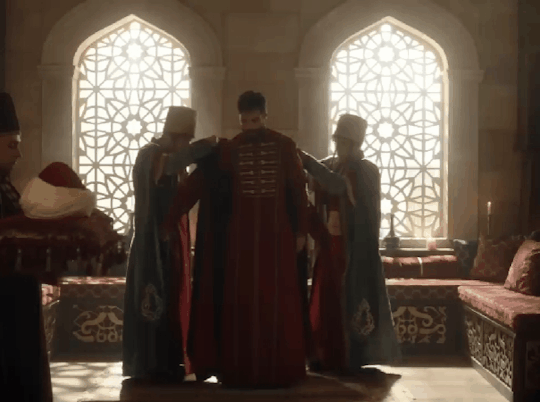

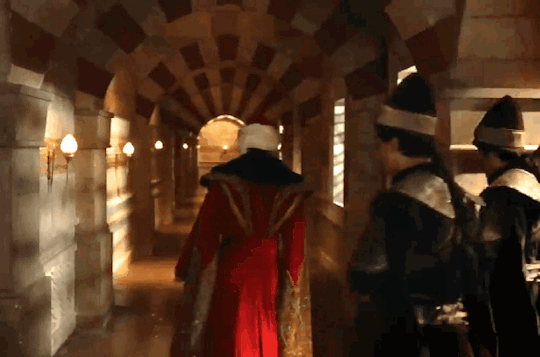
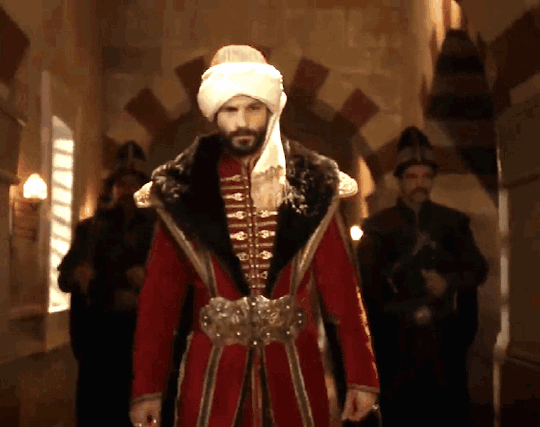
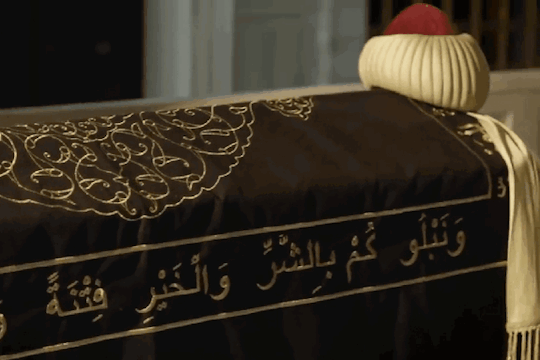
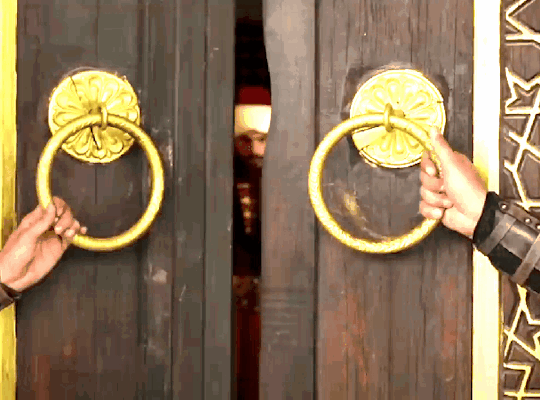
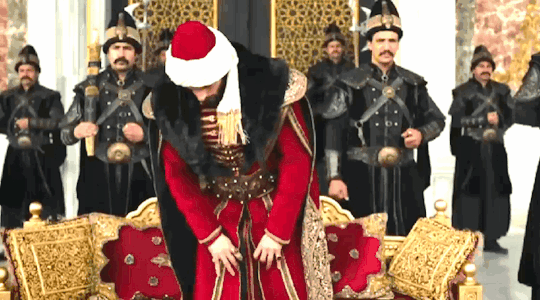
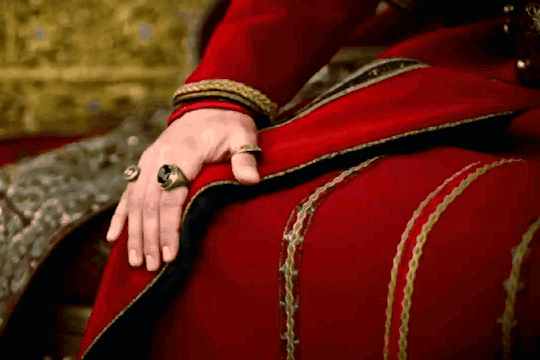
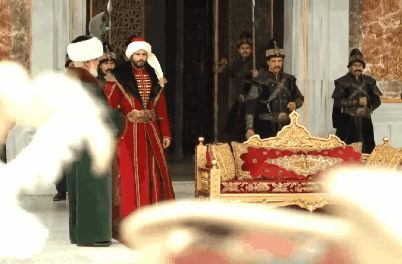
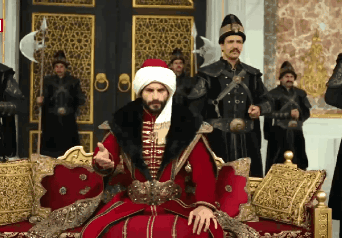
Some costumes in the TV series Mehmed: Sultan of Conquests + The red caftan worn by Sultan Mehmed during his accession ceremony, with a red collar and a gold belt on the belly in Ep.7, P.1
#Mehmed: Fetihler Sultanı#fatih#fatih dizisi#osmanlı devleti#osmanlı#osmanlı imparatorluğu#sultan#Padişah#period drama#perioddramaedit#periodedits#period#perioddramasource#perioddramagif#periodedit#costume#ottoman#episode 7#part 1#series#gif
43 notes
·
View notes
Text
I repeat one of my comments posted on Youtube
If I had my say on the way Suleiman's children were portrayed, because like a lot of people, I didn't like the way it was written in Magnificent Century, that's what I would do. ( In my eyes, Mustafa was seen as a pure white sehzade, which therefore made him in my eyes more stupid and less interesting than he actually was. Mehmed was practically erased of his personality and seen as a pure Gary Stu like his half brother. Cihangir, who I adore, yet in the series was too naive. Selim is seen as evil, etc...)
I would respect the historical point of view more. I propose an alternative version, I would have added Suleiman's children he had when he was sehzade with his other concubines before he became Sultan and met Hurrem and then had them die of the plague as it was historically.
Sehzade Mustafa - I would keep his childlike personality, except he is not close to his siblings (because of the fratricidal law), and I wouldn't put him close to Ibrahim at least until he becomes an adult and allies himself with him. I would let his mother take care exclusively of his education. A young man who craves recognition and attention from his father, who often neglects him in return over his other children due to the fact that Mahidevran is the Sultan's least beloved concubine. The more he becomes an adult, and especially a father, the more he resents his father because of the way he treats his mother and him. He does not really understand his father and therefore his fears due to the fact that he did not grow up close to him. I would keep his efficient heir personality because he performs very well despite his father never teaching him well because of his mother who is a very good advisor. Instead of doing something for his military glory or showing off his harem too much, I would focus on how he improves the lives of common people exhausted by too much conquest. I would make his guilt very ambiguous, at the start it is clear that he wants to wait for his father to die to have the throne and restore his mother's honor, however, he realizes that his father lets his vizier lead his life impossible to see even encourages him, does not hide that he preferred to have a son of Hurrem on the throne no matter what Mustafa will do. Following this, the sehzade wants to have a second plan like his grandfather in case Suleiman wants to abdicate in favor of another of his sons which would put him in danger (which could explain the Venetian correspondence, others say that it was a plan to prevent his brothers from escaping if one day he became Sultan) but hesitates to actually carry it out, then after some hesitation goes to his father's tent and gets strangled. Instead of doing Atmaca, I would focus on Mustafa's son-in-law, Nergissah's husband who started as Rustem's ally and becomes his most loyal supporter ( it seems that it is more a legend than truth, but I didn't remeber well as I didn't have on me my books of historian like Halil Inalcık) . So I would avoid making a treacherous Sehzade, his mistakes would be understandable, but he wouldn't be a pure white Sehzade.
Sehzade Mehmed: it's more complicated for him because he died without having proven himself in a complicated province like Amasya, so it's quite difficult to make a comparison with Mustafa. But I would make sure to give him a real personality: initially close to some of his brothers like Selim and Bayezid, he becomes, despite his mother, more distant towards them because of the fratricide (Mehmed II had therefore legalized it there is not much way to escape from it at the time unlike MCK) although he is very close to Cihangir and his sister. Unlike Mustafa, his father trained him in the regency of the palace and he did very well by dint of advice and practice. When he is sent to the provinces, he often listens to his mother's advice when she visits him. Knowing that he has the support of the statesmen against Mustafa he realizes knowing his father better than his half brother that he will have to play the role of the obedient sehzade not interested in politics although deep down he prepare for it. He has the happiness of being a father but dies immediately afterwards.
Mihrimah Sultan- I would make sure to respect the historical Hurrem who wants her daughter to have a marriage of love and happiness. However Suleiman prefers Rustem, and she accepts him immediately because she will do everything to save her brothers and convince her mother to accept this marriage. I would rather show her as a politician as well as her diplomatic relations. However, I would underline the unjust side of Suleiman, he had Mustafa executed and condemned Mahidevran to poverty but refuses to punish Mihrimah by banishing her because she would have helped Bayezid financially during his rebellion. Their relationship would be cold for a time before reconciling. She will be reconciled with her brother Selim because basically they only remain and will be an ally of Nurbanu.
Sehzade Abdullah- I would have included him even if he died very young.
Sehzade Selim- Initially a cultured young man very focused on charity work like his mother and sister and very sober. Nevertheless it is often sad due to the law of fratricide. When Mustafa dies, he realizes he has a chance to escape it and he will fight in a wicked way especially for his son Murad because he knows that Bayezid's temper will put him in danger besides fratricide. He knew how to recruit powerful and efficient state members. He is on the whole an obedient sehzade but who is disgusted with his father's treatment of Mahidevran (after all she is no longer a threat to him she no longer has a son) and who will take risks to her by helping her financially. As the hardships go on, his depression increases he drinks more and more especially after his sister takes the part of Bayezid, that his brother Bayezid dies, and the fact that he is obliged to make other sons in the case where Murad dies without an heir which means that he knows that his other sons will be condemned to death. He has become a broken leader although he makes sure there is effective governance.
As a Sultan he must face his father's mistakes, including the way he led the Empire, including too many wars and unnecessary conquests in Europe.
Sehzade Bayezid- Him complicated. Due to his explosive temper he is the black sheep of his siblings (Mustafa does not count since he is a half brother, they do not even know each other) and the most incompetent of Suleiman's sons and Suleiman is worried because he has inherited the worst faults of Selim Yavuz like being angry easily (without having had his qualities). Yet deep down he wants affection and that's why he has several children even if it's irresponsible, his mother favors him because she's afraid for him because he has too impulsive nature . Mihrimah comes to his aid only in memory of his mother, because deep down she prefers Selim, Bayezid knows this, which means that he hardly listens to her. She only helps him financially as a last resort because she couldn't convince him to call off the rebellion. Suleiman was more lenient to his mistakes that Mustafa (we could once again underline the unfair side of Suleiman again with this) until the point that he took refuge to the Shah.
Sehzade Cihangir- A cultured young man very close to his parents and very sick. I would make him a supporter of Selim because although he is close to him, he also knows that he is his only chance of survival because he is not close to Bayezid at all. He often sends information from the Palace to Selim to better aid him in managing his province and at times advises him to be more ruthless in his quest for the throne while remaining an obedient sehzade. It would therefore be a good adviser for Selim (and it would give him more personality). He cannot therefore be limited to the role of a simple supporter but also of a valuable advisor.
And that's how I would portray them if I were in the place of the screenwriters. They are all very nuanced (we avoid all white or all black), we can freely pick a favorite without trying to favor another sehzade at all costs, and I try to be consistent with what we know about them and try to explain why they did mistakes or make sucess.
#magnificent century#mihrimah sultan#sehzade bayezid#sehzade selim#Mustafa sehzade#hürrem sultan#suleiman the magnificent#sehzade Mehmed#mahidevran hatun#Şehzade Cihangir#historical interpretation#historical inaccuracies
36 notes
·
View notes
Text
Characters that should have been included in the TV Shows:
In all the series about Fatih Sultan Mehmed, mostly only Gülbahar was shown. Gülşah and Çiçek appeared only once, and his wife Mükrime Hatun wasn’t shown at all. While I understand that the series portrayed different periods of his reign and that Çiçek was a later concubine, after the conquest, so she wasn't present during the time shown in the newest Fatih Series, it still lacked representation of important figures.


earlier consorts of Suleyman, especially the mother of Şehzade Mahmud (his actual eldest son).

Gevherhan Sultan, the daughter of Nurbanu and Selim II, was also missing from Magnificent Century: Kösem while at that time she was very important figure

Handan Sultan's daughters should also have been inciuded.

instead of including Murad IV’s second Haseki, the series created a fictional character, Farya, as his love interest

#ottoman empire#history#youtube#istanbul#hasekisultan#fyp#hatun#sultanmurad#consorts#sultan#farya sultan#handan sultan#fatihsultanmehmed#çiçekhatun#gülşah#gülbahar#gevherhan sultan#muhtesem yuzil kosem#muhtesem yuzyil
6 notes
·
View notes
Text
Master Post - Other Series
Themes
Costumes | Jewellery | Props
Kızılelma: Bir Fetih Öyküsü / Golden Apple: The Grand Conquest
Çandarlı Halil Paşa
Gülcicek Hatun
Mara Branković
Mehmed II
Nergis Hatun
Orhan Çelebi
Şehzade Alaeddin
Unnamed Enderûn Students
Mehmed Bir Cihan Fatihi / Mehmed the Conqueror (2018)
Çandarli Süleyman
Esleme Hatun
İshak Paşa
Leyla Hatun
Mehmed II
Melike Hatun
Mehmed Fetihler Sultani / Fatih (2024)
Halime Hatun
Hüma Hatun
Mara Branković
Zoe Paraspondyle
Rise of Empires: Ottoman
Elena Hatun
Hüma Hatun
Mara Branković
Tozkoparan İskender
Asya Türkönder
Efsun
Elif Baharvadi
Matrakçı Nasuh
Sinan Karayaman
Unnamed Istanbul Citizens
#Muhteşem Yüzyıl#Muhteşem Yüzyıl: Kösem#Magnificent Century#Magnificent Century Kösem#Magnificent Century Kosem#Tozkoparan İskender#Rise of Empires: Ottoman#Fatih (2024)#Fatih#Mehmed Fetihler Sultani#Fatih Sultan of Conquests#Fatih (2018)#Mehmed Bir Cihan Fatihi#Mehmed The Conqueror (2018)#Kızılelma: Bir Fetih Öyküsü#Golden Apple: The Grand Conquest#Master Post
7 notes
·
View notes
Text
Mehmed II: The Conqueror
Mehmed II, also known as Mehmed the Conqueror, ruled the Ottoman Empire from 1444 to 1446 and again from 1451 to 1481. He is best known for his pivotal role in the conquest of Constantinople in 1453, marking the end of the Byzantine Empire and a significant moment in world history. His childhood dream of capturing this "Rome of the East" came to fruition when he led a massive siege utilizing innovative artillery, including massive cannons, to breach the city's formidable walls.

The fall of Constantinople transformed it into the new capital of the Ottoman Empire, which he renamed Istanbul. Mehmed's vision extended beyond conquest; he sought to restore and enhance the city's glory. He converted the Hagia Sophia into a mosque, symbolizing the cultural and religious shift, but also maintained a policy of religious tolerance, allowing other faiths to coexist.
Mehmed's administration was marked by significant reforms, establishing a centralized government and a legal framework known as the "Kanun of Mehmed II." This set of laws worked alongside Islamic law, helping to govern a diverse population. He also expanded the empire's borders through military campaigns in Serbia, the Balkans, and further afield, while promoting arts, architecture, and education.
His legacy is not just military; it includes the establishment of a cultural renaissance within the empire. He invited scholars and artists to his court, fostering an environment rich in learning and creativity. Mehmed II's reign laid the foundation for what is often referred to as the "Ottoman Classical Age," highlighting his role as one of history's most influential rulers.
0 notes
Text
Mehmed/MC - Fic Recommendations
An asterisk (*) before the title indicates the fic is in Russian! (I read with a browser translator and it's fine! Sometimes some things sound funny and/or pronouns are translated wrong, but it's all understandable!)
All the fics are completed!
Collision by BorgiaBarbie
Laia struggles when the return of Mehmed complicates her already messy love life with Noe. Oh, and she has one week to restore a priceless painting. Can Laia somehow figure out who she is and what she wants before the sand in the hourglass runs out? Laia/Mehmed and Laia/Noe. Mess. Chaos. Jealousy. Angst. Set after the events of Dracula a Love Story Season 4 Episode 3. Chapters 9 & 10 are set 6 months later.
Hilarious? Check ✅ Great writing? Check ✅ Fluff, angst, humor, and smut?! Check ✅
Also, chapter 4 is what most people would call a religious experience. Please, please do yourself a favor and read it.
The Sultan’s request by nesrinslittleworld
Lale Hatun has a conversation with her Uncle when she visits him with the second portrait.
Really well-written short fic. Mehmed/MC is just implied, but I really enjoyed this look into Lale's conflicted feelings about him.
*The trap of excitement by Akulova Anastasia
After her joint incognito outing with Shehzade, Lale continued to avoid Mehmed, fearing her own feelings, and he, having chosen the path of her methodical conquest, found another safe way to get closer, which could not help but seduce the gambling nature of the Sultana: he promised to teach the game of chess, bypassing the prohibitions. The tactics turn out to be correct, but soon Mehmed sets off on a new campaign. On what note will they say goodbye to Lale, and will she agree to one small bet?
This fic has excellent Mehmed characterization, excellent chemistry and development between him and Lale, an amazing dance scene, and a top-notch epilogue. No spoilers, but there's a moment between the two in the smut scene that I find beautifully done and quite touching!
*Obsession by Akulova Anastasia
“Sorry… God, I don’t know what came over me,” I muttered in confusion and embarrassment, for some reason backing away and awkwardly knocking over the paints. Damn it, in this life we have known each other for only a few days and we are not connected by anything except the memories of the reckless passion of young Lale, who probably did not end in anything good, another me, who has long fallen asleep. So why am I now torn by such unbearable thirst and longing? Why did I… kiss him?
Some beautiful and memorable moments between Laia and Mehmed in this one, especially in chapters 2 and 3. To further entice you, I will say one of these excellent moments involves a knife 🙏🙌
*Swallow and flame by linalisavv
“I need to run away from you like fire, but I’m flying towards you like a stupid, naive moth, hoping not to scorch my wings,” Lale said almost in a whisper. Her lips collided with the Shehzade’s, and the air around sparked.
This fic (set after 3x11) imagines how Lale and Mehmed could get together in the Ottoman Empire. I think it's very well-written! And while Vlad plays a minimal role here, I think it's fun that this fic is technically set in a Mehmed and Vlad route. Kudos for the sweet epilogue too!
*A fragile tulip in his hands by Seagull with cookies.
Her mind told her: “Get out, run. He is a cruel tyrant. Madman. He will destroy you." And my heart screamed: “It won’t hurt. Can not. His feelings are too strong."
Friends... This one made me insane. It had a lot of things that fit their canon dynamic so well! I want to let you experience it for yourselves, so I'll just say: drawings, teasing, understanding, breathplay (!!!), and falling in love. Please read it.
*On the edge of the abyss by Little_romantic
"I'm scared. I'm afraid it will hurt again…" "I will never hurt you." His whisper sounded so convincing, so soulful that goosebumps ran across my skin. She knew he believed it, but…
I have recommended this one before, and I will do it again! Each chapter is independent from the others, but guys, the sheer longing in these glimpses of them as Mehmed and Lale want, more than anything, to make them work even as they're scared because, you know, it's them... I think it's a beautiful work and it makes my heart just go out to them.
#i hope you give them a go! they're all truly excellent#romance club#dracula: a love story#dracula a love story#rc dls#rc dracula a love story#mehmed x mc#rc mehmed#ficrec#q
53 notes
·
View notes
Text

Rumelihisarı as seen from Bosphorus strait.
Rumelihisarı, also known as the Rumelian Fortress or Roumeli Hissar Fortress, and sometimes referred to as Boğazkesen Fortress (meaning "strait-cutter fortress"), is a medieval Ottoman stronghold situated in Istanbul, Turkey. It stands on a series of hills along the European side of the Bosphorus. The fortress gives its name to the surrounding neighborhood within the city's Sarıyer district.
Built between 1451 and 1452 CE under the orders of Sultan Mehmed II, the fortress was constructed as part of preparations for the Ottoman siege of the Byzantine city of Constantinople. Its purpose was to block any potential maritime aid from the Bosphorus Strait to the Byzantines, giving rise to its alternative name, "Boğazkesen," or "Strait-cutter" Castle. A sister structure, Anadoluhisari ("Anatolian Fortress"), lies on the opposite side of the Bosphorus, and together, they effectively controlled naval traffic during the siege, playing a critical role in the Ottomans' successful conquest of Constantinople (later renamed Istanbul) in 1453.
Following the conquest, Rumelihisarı functioned as a customs checkpoint and occasional prison, notably detaining diplomats from enemy states. After sustaining significant damage in the Great Earthquake of 1509, it was restored and remained in use until the late 19th century.
Today, the fortress is a popular museum and serves as an open-air venue for concerts, art festivals, and special events.
#ottoman#ottoman art#ottoman history#ottoman empire#turkish#turkish history#turkish art#islamic#islamic history#islamic art#medieval#middle ages
4 notes
·
View notes